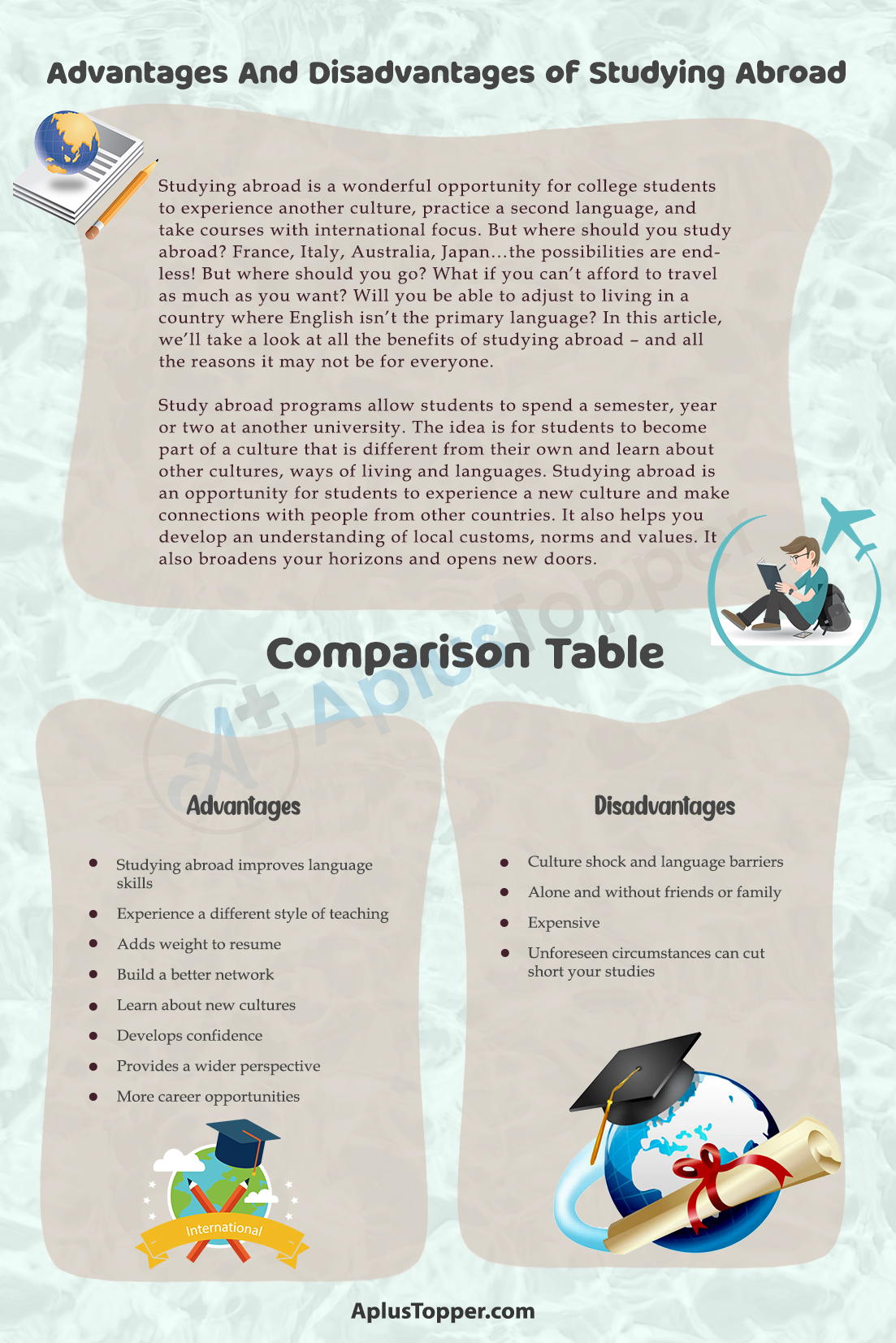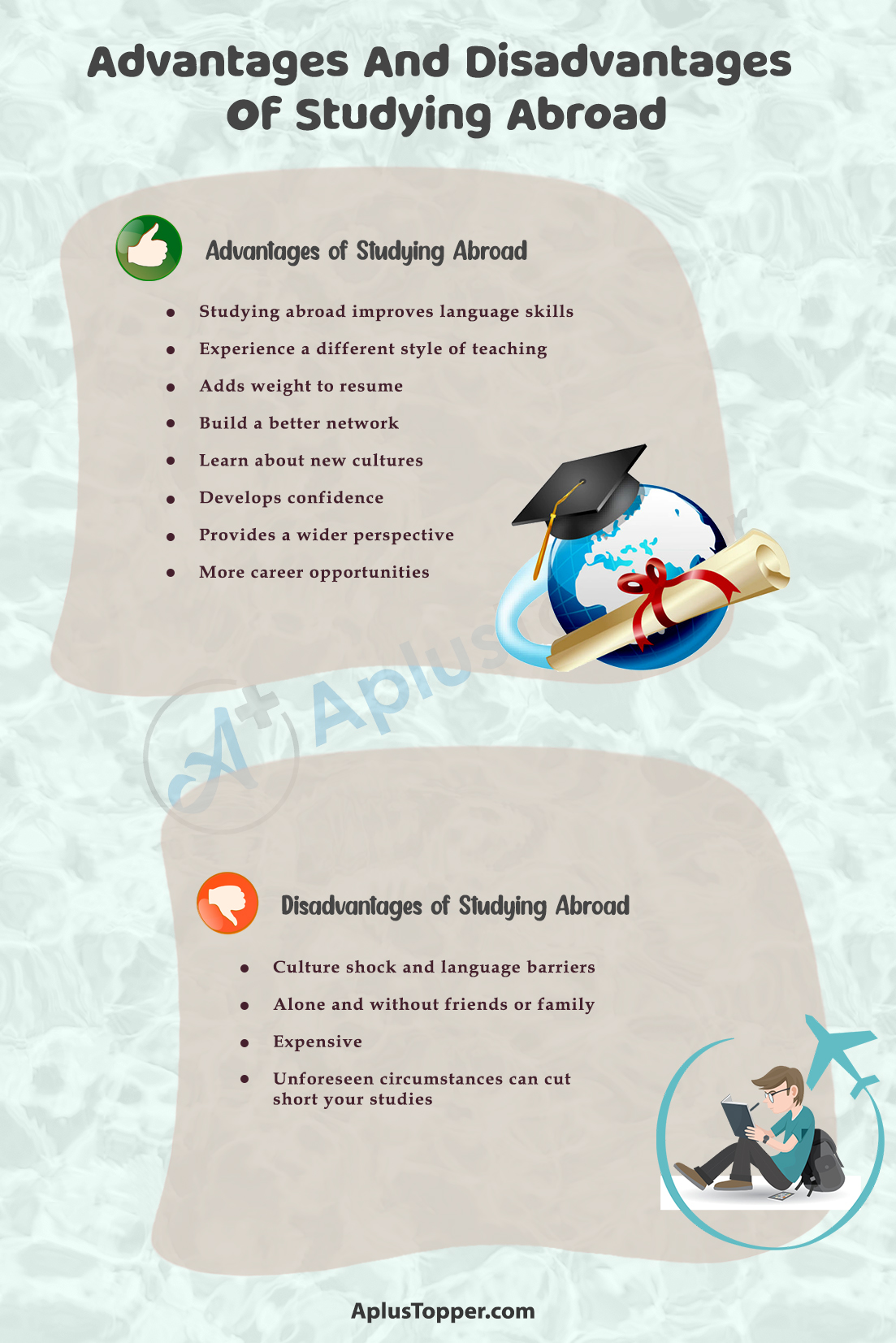Advantages And Disadvantages of Studying Abroad: Studying abroad is a wonderful opportunity for college students to experience another culture, practice a second language, and take courses with international focus. But where should you study abroad? France, Italy, Australia, Japan…the possibilities are endless! But where should you go? What if you can’t afford to travel as much as you want? Will you be able to adjust to living in a country where English isn’t the primary language? In this article, we’ll take a look at all the benefits of studying abroad – and all the reasons it may not be for everyone.
Study abroad programs allow students to spend a semester, year or two at another university. The idea is for students to become part of a culture that is different from their own and learn about other cultures, ways of living and languages. Studying abroad is an opportunity for students to experience a new culture and make connections with people from other countries. It also helps you develop an understanding of local customs, norms and values. It also broadens your horizons and opens new doors.
Students can also find more Advantages and Disadvantages articles on events, persons, sports, technology, and many more.
Even though there are many benefits, there are some drawbacks as well. For example, it can be difficult to stay connected with your family back home which may lead to homesickness. Other factors to consider include extensive planning and decision-making. This is especially important when it comes to finances. For instance, when you are studying abroad it’s important to plan ahead because of the high cost and expenses. It’s important to allocate a budget for accommodation, flights, and spending money. On top of this, make sure you have an emergency fund set aside. You may also need to purchase some items that are not available in your destination country like vaccinations or medications.
- Advantages of Studying Abroad
- Disadvantages of Studying Abroad
- Comparison Table for Advantages and Disadvantages of Studying Abroad
- Conclusion on Studying Abroad – Advantages And Disadvantages
- FAQs on Advantages And Disadvantages of Studying Abroad
Advantages of Studying Abroad
Studying abroad provides a lot of benefits. Some of the benefits include: learning new things, meeting people from other cultures, developing an appreciation for different cultures and customs, and obtaining an international perspective. Other advantages of studying abroad are as follows:
- Studying abroad improves language skills – Studying abroad is a great opportunity to improve your language skills. You will be surrounded by other people who speak that particular language as often as possible so it’s bound to rub off on you over time. You’ll also be able to see the way that other cultures and societies operate, which can help you become a more informed person in general.
- Experience a different style of teaching – Studying abroad can be an amazing way to study. You will have the chance to experience a different style of teaching, meet new people, and see how other cultures handle education. Studying abroad is also an incredible opportunity for you to learn about yourself and gain confidence in your abilities – something that many students never get a chance to do while they are at home.
- Adds weight to resume – Studying abroad may not seem like a big deal to some people, but it is actually a huge factor when applying for jobs. It shows that you are willing to take risks and make sacrifices in order to achieve your goals. Whether or not you don’t get the job you applied for, studying abroad is an experience that will only further your understanding of what career path to take in the future.
- Build a better network – Studying abroad is a great opportunity to enhance your network and make connections that you would most likely not have otherwise. You will not only experience different cultures and ways of life, but you will also learn more about yourself. With the help of other students who are going through the same thing, it can be easier to transition into an unfamiliar environment and experience new things without feeling overwhelmed.
- Learn about new cultures – Studying abroad is an incredible opportunity to make new friends, learn about different cultures, and broaden your perspective. It is also a great way to avoid getting caught in the bubble of US culture and media. When you live in the US, it can be hard to see other perspectives because we are consumed by our own lifestyle. Studying abroad will help you understand that there are many ways of life and that not all of them are perfect.
- Develops confidence – Studying abroad is a once in a lifetime opportunity to experience life outside your comfort zone. The confidence you’ll gain will be invaluable and can help you deal with any difficult situations that arise in the future. They also offer an opportunity to meet people from all over the world with different perspectives. Studying abroad will give you a wider perspective on the world and make you more prepared for whatever comes your way.
- Provides a wider perspective – Gaining a world view is an essential part of the college experience. Studying abroad will provide you with the opportunity to explore other cultures and learn about new areas of study in a very different environment. You will also get to take in all that the new culture has to offer, giving you better insight into what it’s like to live there. Having this knowledge will help you choose your career path and future lifestyle.
- More career opportunities – Studying abroad opens up a world of possibilities. Your perspectives on the same career paths that you previously saw as closed to you may be completely changed by the time you come back home. You will also have more options for employment because you will have been exposed to so many different cultures and career paths outside your own.
Disadvantages of Studying Abroad
Studying abroad is a great way to learn a new culture and expand your knowledge of the world. However, there are some disadvantages to travelling abroad. One disadvantage is that you may have trouble with the language barrier. Studying abroad can also be an expensive endeavour, so make sure you consider these drawbacks before leaving for your country of choice. Other challenges of studying abroad are as follows:
- Culture shock and language barriers – Language barriers are a major issue for students who choose to study abroad. Unless you’re taking courses in your native language, you will have to adjust to the new culture’s way of life. You may not be able to understand or speak with the locals and you may face difficulties communicating with other students from your home country. Culture shock can make it difficult for you to adjust because of the different norms and customs of your host country.
- Alone and without friends or family – Although, you may get a chance to experience all the things that your friends back home are experiencing and have opportunities for once-in-a-lifetime experiences, studying abroad is not for everyone. There are some disadvantages to studying abroad such as being on your own. You’re far away from anyone who can help you with anything and it may be hard to rely on others who aren’t in your same situation. Educating yourself during these situations is key.
- Expensive – The cost of studying abroad can quickly add up. First, you have to pay for tuition and fees in the country where you will be studying. Next, if you’re staying with a host family or renting an apartment, you have to factor in the cost of living. This can be costly depending on what country you are travelling to. Finally, there will be some costs that are unavoidable like paying for food and transportation once there.
- Unforeseen circumstances can cut short your studies – Political tensions, such as riots, or even wars can have a very detrimental impact on students, which can often turn life-threatening, as seen in the current Ukraine Russia war.

Comparison Table for Advantages and Disadvantages of Studying Abroad
Following are the advantages and disadvantages of Studying Abroad.
| Advantages | Disadvantages |
| Studying abroad improves language skills | Culture shock and language barriers |
| Experience a different style of teaching | Alone and without friends or family |
| Adds weight to resume | Expensive |
| Build a better network | Unforeseen circumstances can cut short your studies |
| Learn about new cultures | |
| Develops confidence | |
| Provides a wider perspective | |
| More career opportunities |

Conclusion on Studying Abroad – Advantages And Disadvantages
Studying abroad is a great way to enhance your college experience. It can also help you in the future because of the professional and personal skills you will learn. The benefits far outweigh the drawbacks, but there are some drawbacks to keep in mind.
FAQs on Advantages And Disadvantages of Studying Abroad
Question 1.
Why study abroad?
Answer:
Studying abroad is a global phenomenon that has been growing in popularity over the last few decades. The term “study abroad” refers to what happens when someone goes to a different country while they’re studying. Different countries have different costs, benefits, and drawbacks of their own, so it’s important to consider what factors are most important to you before deciding which study abroad program to pursue. Some things to consider are how much time you want to spend abroad, whether you need accommodations or not, how difficult the language will be for you, and how much money you want or don’t want to spend.
Question 2.
What are the advantages and disadvantages of studying abroad?
Answer:
Studying abroad is a great way to learn about a new culture and become more globally minded. The drawbacks are the added cost of living and the danger of becoming homesick. Studying abroad can also be distracting because it’s difficult to focus on your studies when there are so many distractions in a foreign country.
Question 3.
Is studying abroad a good idea?
Answer:
Studying abroad can give you an amazing opportunity to learn about diverse cultures and other languages. Studying abroad can also help you get a better understanding of the culture that you come from. Finally, studying abroad may help you find a job in a global market. It may be difficult to maintain strong relationships with friends and family while studying abroad, but if you are aware of the challenges before going to study, then it should not be too hard.
